Spirituality

Editor’s Note: The following poem by Trevor Scott Barton was written while he was living in Africa and reading The Little Flowers of St. Francis of Assisi.
Holding you in the palm of my hand
I see your tiny feet and hope you'll live and walk these stony paths
To the pump to get water.
Blessing you in your meekness and gentleness,
You are Jesus to me today.

I have multiple online identities, the result of subconsciously trying to be a better version of myself — a better follower of Christ. But these various personalities that I portray among social media sites are fabrications. Here are a few examples why:
The single verse I post on Twitter is the only Scripture I read all day — even though my Facebook profile claims that the Bible is one of my favorite books.
C.S. Lewis, Dietrich Bonhoeffer, Donald Miller, and Francine Rivers are also listed, but only to prove my Evangelical IQ.
I’m #prayingforSandyHook and #prayingforBoston and #prayingforOklahoma, but I rarely pray.
I repost memes about global poverty, loving the poor, reconciliation and promoting peace, but I spend all of my spare time watching Netflix. ...

The more I study theology and the more I take Jesus' teachings seriously, the more messy my life becomes.
I was raised to believe that Christianity is about going to church on Sundays, not saying bad words, trying to be good, and having all the right beliefs (and knowing who doesn't have the right beliefs). Within this framework, Christianity is very neat and proper. One dresses in such a way that conforms to modesty (no tattoos and piercings, thank you); one uses coined phrases to know who's really in or out (we say 'blessed' not 'lucky'); one never touches a cigarette or consumes alcohol (because that's what makes us 'not of this world' right?); and one makes sure to only hang out with those who have the same beliefs (for having different beliefs or opinions is clearly a sign of waywardness). This was my world all the way into my 20s.
Then something happened. Or, in actuality, many things happened. I am unable to pinpoint one thing that upended my world. It was a bunch of little and big things that projected me onto a path of radical living, and I give the credit to the Holy Spirit (and to my husband, but that's another story).
As a result of those many little and big things, I began to see the teachings of Jesus and the New Testament in new light. Passages I had heard all my life took on a whole new and radically different meaning. Beliefs I had taken on without thinking came crashing down, as I began to hold them in view of Christ's teachings. It was then I started to discover how far off my thinking, and thus my life orientation, was.

When it comes to running, America often looks like a country divided between apostles and apostates.
For true believers like Olympian Ryan Hall, marathons assume an almost-biblical importance.
“I have heard stories and had personal experiences in my own running when I felt very strongly that God was involved,” Hall, an evangelical Christian, has said.
Other Americans — athletic atheists, you might call them — roll their eyes and see marathons as a painful waste of a perfectly nice day.
In the Church of Running, I sit somewhere in the back pew.
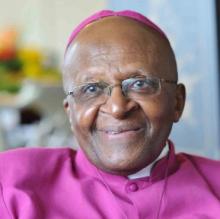
Desmond Tutu, the former Anglican archbishop of Cape Town, South Africa, who won a Nobel Peace Prize for his battle against apartheid, has won the 2013 Templeton Prize, which is billed as the most significant award in the field of spirituality and religion.
Tutu, who has not been afraid in recent years to criticize leaders in his country and across Africa for humanitarian and political shortfalls, was cited for his work in advancing the cause of peace and the spiritual principles of forgiveness.
“By embracing such universal concepts of the image of God within each person, Desmond Tutu also demonstrates how the innate humanity within each of us is intrinsically tied to the humanity between all peoples,” Dr. John M. Templeton, Jr., the president and chairman of the John Templeton Foundation, said in a video statement released Thursday announcing the $1.7 million award.

I’m no postmodern theology expert, so I’ll leave it to the pros to explicate more about what’s what in postmodern thought. But for me, the exciting work revolves around supplanting things like binary, propositional “truths” about God with more inductive, open-ended notions of the Divine that transcend religious doctrine or even our own mental constructs of God. This is both a necessary and a liberating process, I think, that indeed can lead the Church (big C Church, that is) toward something far more reconciling and healing for humanity than the modernist approach to faith we’ve employed for many decades now, if not some centuries.
It’s helpful to look back a little bit at where we’ve come from in our religious and theological evolution of thought and practice. At the risk of geeking out on something that puts everyone to sleep, I’ll try to make this quick and fairly painless. Interestingly, it can be argued that the more fundamentalist strain of Christianity can trace its origins back to the “liberal” thinking following the Enlightenment that suggested all things – faith, God, and religious thought included – could be explained by rational means. This hyper-rationalism sought to build up rhetorical constructs that made a case for God, so to speak, as well as buttressing the doctrines of the Church.

Nuanced or not, are Christians, especially evangelicals, perceived as being against things like peacemaking? Or is it that their version of peacemaking is backward looking toward some halcyon day of yore (or 1950s America)? At this point in the book, Rob spends a lot of time walking us through the development of justice in the Bible from “eye-for-an-eye” to “turn the other cheek.” I want you to read this chapter for yourself and make your own conclusions about what Rob sees and tell me if you see it, too.
Rob's thinking is that people are gradually cluing in to God's vision of a world without retributive violence. “Revenge always escalates,” he writes. Always.

Tripp Hudgins touched on something in his post yesterday that is essential to this discussion about Rob Bell and his book What We Talk About When We Talk About God. He wrote:
Why does Rob write this stuff? Whose side is he on? Yours. Mine. Ours … Rob is on everyone’s side. He’s trying to live like the God who meets him when he’s surfing, hanging with his kids and friends, walking along the city streets, or doing just about anything.
Tripp, how can you say such a thing! “Rob is on everyone’s side”? How could Rob possibly be on the side of those who ruthlessly criticize him?!? I’m sorry my friend, but that’s just ridiculous and absurd.
And yet the ridiculous and absurd is at the heart of the Christian message. I hope that Rob is for everyone. Not because I need Rob to be on my side, nor because I need his approval or acknowledgment. (Although, I wouldn’t mind it!) Rather, I hope it’s true because at the heart of the Christian message lies the ridiculous, absurd, and even scandalous message that God is for everyone.

It's the Monday after Easter, and I couldn't think of a better day to talk about God being with us. Adam Ericksen wrote about the dance of doubt and faith on Good Friday, the challenge and beauty of embracing the fullness of the journey. Rob takes that all one step further in this chapter: With.
There is, I believe, another way to see God, a way in which we see God with us— with us, right here, right now. This isn’t just an idea to me; this is an urgent, passionate, ecstatic invitation to wake up, to see the world as it truly is.
(Kindle Locations 1201-1203)
Suddenly I have “Right Here, Right Now” by Jesus Jones playing in my head. Excuse me for being a child of the 80s.
My take-away? This God doesn't choose sides like we do.

This is going to be a problem. This chapter on faith and science and quantum mechanics is going to be a problem. Why? Well, because this faith and science thing has been done to death. Did you know that the Vatican has an observatory and that one of the authors of Red Shift Theory was a Jesuit? Yep. The famed Scopes Monkey Trial was more than a century ago and those of us in the Protestant Mainline have long ago made peace with it. The Vatican apologized for the oppression of scientists, most specifically it said that Galileo was right. Scientific inquiry and Biblical interpretation are not the same thing. So what's Rob's purpose for this chapter?
Well, it's manifold. He's an evangelical. He's writing in some ways to other evangelicals, specifically those who have felt cut off from the tradition. Here in the States, the classic evangelical line holds echoes of the arguments used during the Scopes Monkey Trial. Some in that Christian tradition are still fighting that fight. Heck, some progressives are, too. Powerful (if false) dichotomies have been established.
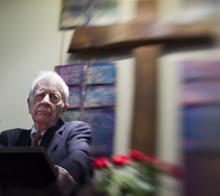
Gordon Cosby was my spiritual father, not simply a brother in Christ. This relationship continued for some 45 years until his dying days. In a time when egalitarianism defines nearly all relationships as the desired norm, it’s well to remember the role of mentors who maintain, purely through their own internal integrity and faithfulness, a spiritual authority in the lives of others. Gordon Cosby was such a person to me, and to countless others.
I first encountered Gordon when I was a young legislative aide on the rise in Washington, D.C., working for Senator Mark O. Hatfield and his legislative efforts to end the Vietnam War. Disgusted with the moral vacuity of the evangelicalism that had been my heritage, but searching for faith that was more than just following a progressive social agenda, I discovered the Church of the Saviour. Gordon’s insistence that following Jesus required a disciplined inner spiritual journey always expressed in joining God’s outward mission in the world captivated me then, and ever since.
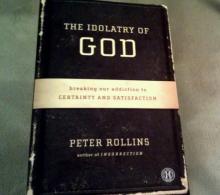
"They look like big, good, strong hands, don't they. I always thought that's what they were. Ahh, my little friends, the little man with his racing snail. The nighthawk. Even the stupid bat. I couldn't hold on to them. the Nothing pulled them right out of my hands. I failed." -Rock-biter, in The Neverending Story
In the movie The Neverending Story, there's an alternate reality called Fantasia made up of all the hopes and dreams of humankind. But gradually people have stopped believing, hoping, dreaming, and wishing. And so a mysterious someone seized the opportunity and unleashed a dark void that gradually devours all the beautiful creations. The Nothing. The creatures of Fantasia are powerless to stop it. Why was the Nothing unleashed?
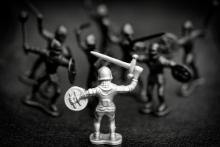
It's an important question. Mark Driscoll, the famed neo-Calvinist, wants us to believe that we are God's enemies and God desired our destruction until Jesus, God's own Son, put himself in harm's way and saved us from God. Interesting theological gloss...but there's something in this I'm pondering right seriously this morning...
...What's it like to wrestle with the Divine One? You know, like Jacob did there in the desert one night. You can contend with God, can you not? Is God not then your enemy in some way? Well, perhaps your adversary? I don't know for certain if any of this language suits, but I'm pondering it because God and I are engaged in a cage match and I am mustering all the courage I have not to pull out a folding chair or some such mess knowing full well that God cheats.
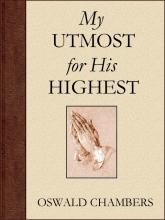
Modern passages from Oswald Chambers' classic devotional reader "My Utmost for His Highest."

"THIS IS THE LORD'S DOING; it is marvelous in our eyes. On this day the Lord has acted; we will rejoice in and be glad in it." We will be singing these words from Psalm 118 on Easter Sunday, and they pinpoint a critical issue in our religious witness. Do we have the courage to have God be the subject of sentences, or is God usually the object of our reflections? There is a difference. Do we make ourselves really the subject of our sentences, so that religion is about our doings and ideas and needs? The scriptures insistently talk about what God did and is doing and will do in Christ, the crucified and risen one. Our role is to rejoice in the way God acts upon us, with us, around us, behind us, above us, ahead of us, through us.
Praise is the litmus test. If God is experienced as the one who is acting, the impulse to praise is inevitable. This may help us understand the importance of the psalms in our lectionary. They aren't mere supplementary devotions. As supreme words of praise, they test the authenticity of our reactions to the good news. They test and they can train. The psalter is the church's manual to help practice the "scales of rejoicing," to borrow a phrase from W.H. Auden's "Christmas Oratorio." A phrase on Auden's tombstone comes back to me: "In the prison of his days / Teach the free man how to praise." The psalms come to life only where this teaching is taken seriously.

C.S. Lewis described himself as a dinosaur as he lived in a cultural landscape that seemed to change before his eyes.
I don’t feel like a dinosaur, but I do feel like a disembodied voice crying in the wilderness as I struggle, like a fish swimming upstream, to believe that the Gospel is real and solid and still matters.
It’s not that cynics and agnostics have convincing arguments – though some do.
And it’s not as if Faith itself has lost its power and edge – because it hasn’t.
Perhaps it’s true in every age, but it certainly seems more true now, that many of those who call themselves believers, believe and live as if they believe a different Gospel altogether.
The contradiction is so thorough, it must be deliberate.

A presidential inauguration is by tradition the grandest ritual of America’s civil religion, but President Obama took the oath of office on Monday in a ceremony that was explicit in joining theology to the nation’s destiny and setting out a biblical vision of equality that includes race, gender, class, and, most controversially, sexual orientation.
Obama’s speech, his second inaugural address, repeatedly cited civic and religious doctrines — namely the God-given equality extolled by the “founding creed” of the Declaration of Independence — to essentially reconsecrate the country to the common good and to the dignity of each person.
It was a faith-infused event that recognized both the original sins as well as the later atonements of America’s history, especially on race, which was front and center as the nation’s first African-American president took the oath on the holiday commemorating the Rev. Martin Luther King, Jr.
And Obama and other speakers vividly traced the nation’s tortuous path from slavery to civil rights — from the Emancipation Proclamation 150 years ago to the March on Washington 50 years ago, the latter presided over by King.

Unlike patients who have a choice about getting the flu shot, many health care workers didn’t have a say this year.
For the first time in Rhode Island, hospital and nursing home workers were told to roll up their sleeves, and hundreds of hospitals in other states have similar policies.
“No one likes to be coerced, and there were some people who objected,” says Virginia Burke, CEO of the Rhode Island Health Care Association, which provides skilled nurses and rehabilitation workers to the state’s nursing homes. “My fear when the mandate came out was we’d lose workforce. To my delight, that hasn’t happened.”
But more than 1,000 workers filed a petition to oppose the directive.

Tuesday was the 84th birthday of Rev. Dr. Martin Luther King, Jr. I don’t know about you, but I miss his words, so I offer a few. King said “people often hate each other because they fear each other, they fear each other because they don’t know each other, they don’t know each other because they cannot communicate, they cannot communicate because they are separated.” I would add to his words: ‘and in that separation they seek guns.’ As an evangelical Christian, I’m going to make this theological.
Wayne LaPierre, executive vice president of the National Rifle Association, said this as his response to the massacre of children at Sandy Hook elementary in Newtown, Conn.: “the only thing that stops a bad guy with a gun is a good guy with a gun.”
That statement is at the heart of the problem of gun violence in America today — not just because it is factually flawed, which of course it is, but also because it is morally mistaken, theologically dangerous, and religiously repugnant.

President Obama will publicly take the oath of office on two Bibles once owned by his political heroes, Abraham Lincoln and the Rev. Martin Luther King Jr. One Bible was well read, but cited cautiously, the other granted scriptural sanction to the civil rights movement.
When Obama lifts his hands from the Bibles and turns to deliver his second inaugural address on Monday (Jan. 21), his own approach to Scripture will come into view. Characteristically, it sits somewhere between the former president and famous preacher.
His faith forged in the black church, Obama draws deeply on its blending of biblical narratives with contemporary issues such as racism and poverty. But like Lincoln, Obama also acknowledges that Americans sometimes invoke the same Bible to argue past each other, and that Scripture itself counsels against sanctimony.
Obama articulated this view most clearly in a 2006 speech, saying that secularists shouldn’t bar believers from the public square, but neither should people of faith expect America to be one vast amen corner.
“He understands that you can appeal to people on religious grounds,” said Jeffrey Siker, a theology professor at Loyola Marymount University in California who has studied Obama’s speeches. ”But you also have to be able to translate your case into arguments that people of different faiths, or no faith, can grasp.”